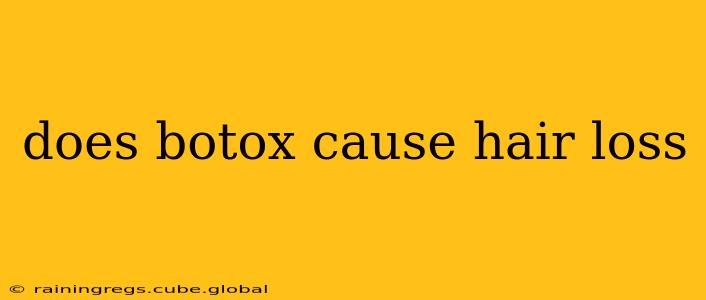The question of whether Botox causes hair loss is a common one, fueled by anecdotal evidence and online speculation. Let's delve into the scientific understanding and explore the complexities surrounding this topic. The short answer is: there's no direct evidence linking Botox injections to hair loss. However, the relationship is more nuanced than a simple yes or no.
How Botox Works
Before addressing the hair loss question, it's crucial to understand how Botox functions. Botox, or botulinum toxin type A, is a neurotoxin that temporarily paralyzes muscles. When injected, it blocks nerve signals responsible for muscle contractions, leading to a smoothing effect on wrinkles. Its effects are localized to the injection site and are temporary, typically lasting several months.
What Causes Hair Loss?
Hair loss, or alopecia, can stem from various factors, including:
- Genetics (Androgenetic Alopecia): This is the most common cause, often linked to family history and hormonal changes.
- Hormonal imbalances: Conditions like thyroid disorders or polycystic ovary syndrome (PCOS) can significantly affect hair growth.
- Nutritional deficiencies: Lack of essential vitamins and minerals can hinder hair growth.
- Medical conditions: Certain illnesses like autoimmune diseases can contribute to hair loss.
- Stress: Significant physical or emotional stress can trigger temporary hair shedding (telogen effluvium).
- Medications: Some medications have hair loss as a side effect.
- Aggressive styling: Excessive heat styling, tight hairstyles, and chemical treatments can damage hair follicles.
Can Botox Indirectly Contribute to Hair Loss?
While Botox itself doesn't directly attack hair follicles, several indirect factors might be considered:
1. Stress and Anxiety Related to the Procedure:
Some individuals experience stress or anxiety before or after Botox injections. As mentioned, stress can lead to temporary hair shedding (telogen effluvium). This hair loss is usually temporary and resolves once the stressor is gone. It's crucial to distinguish this stress-induced hair loss from any potential causal effect of Botox itself.
2. Unintended Injection Site:
In extremely rare cases, improper injection technique could potentially affect the scalp's blood supply, though this is highly unusual with qualified professionals. Any adverse effects related to injection technique are related to the procedure and not an inherent property of Botox itself.
3. Underlying Medical Conditions:
Individuals already experiencing hair loss due to an underlying medical condition might attribute their hair loss to the Botox treatment. However, it's important to understand that the Botox is not the cause, but rather a coincidental factor.
Does Botox Affect Hair Growth?
There's no evidence to suggest Botox directly affects hair growth, either positively or negatively. Its effects are limited to muscle paralysis in the targeted area.
Can Botox be Used to Treat Hair Loss?
Currently, there is no approved use of Botox for hair loss treatment. While some research explores the potential role of botulinum toxin in treating certain types of alopecia, it's not a widely accepted or established treatment.
What Should I Do If I Experience Hair Loss After Botox?
If you experience hair loss after a Botox treatment, consult your doctor or dermatologist. They can help determine the underlying cause and provide appropriate treatment. This is especially important if the hair loss is significant or persistent.
In conclusion, while there are no studies directly linking Botox injections to hair loss, it's important to discuss any concerns with your doctor or dermatologist before undergoing the procedure. Remember that stress related to any medical procedure, as well as pre-existing conditions, can influence hair health. Always seek professional medical advice for any concerns regarding your hair health or any cosmetic procedure.
